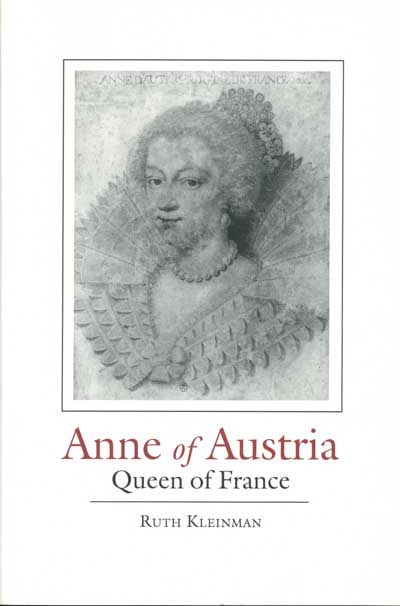Anne of AustriaQueen of FranceRuth Kleinman |
 1985 350 pp. 6x9 $31.95 paperback 978-0-8142-0429-0 Add paperback to shopping cart Shopping Cart Instructions Review/Change Shopping Cart & Check-out | |||
|
|
“The first scholarly biography of the woman who was the wife of Louis XIII and the mother of Louis XIV. Traditionally, scholars have dismissed Anne as almost a non-entity—lazy, fat, stupid, and of little influence in the government. Kleinman offers convincing revisions of each of these assumptions.” —Choice “This bright, never sluggish biography by a professor of history reconstructs Anne’s difficult marriage and her trying times as regent for her young son immediately after the death of her husband. Kleinman’s account is important historiographically, for it establishes the heretofore rather indistinct Anne as a definite figure of quality and of consequence in the maintenance of the French monarchy; it will also prove enticing for general readers of royal biographies, for it is exceptional in depicting how royal lives were led in the seventeenth century.” —Booklist Wife of Louis XIII, Mother of Louis XIV and regent for her son during his youth, she deserves to be Anne of France rather than Anne of Austria. True, her mother had come from Austria to marry Philip III of Spain; but Anne herself had never seen that country. Why the French named her as they did is not clear, but the appellation does serve to underline the fact that Anne never quite lost her alien status in the eyes of many of her subjects and in those of most French historians since. Much that has been written about Anne by historians is less revealing of her than of the writers’ own political preoccupations and historical tastes and of changing fashions in historiography. Before the French Revolution, she was taken for granted as one ancestress of the royal family, and little attention was paid her. Indeed, she figured hardly at all even in accounts of the reign of her son; and her life exerted no appeal for Enlightenment writers. After the Revolution, however, when history was discovered to be a useful tool both for expressing and molding nationality, royalists as well as republicans began to mine history in order to justify themselves. And at the beginning of the nineteenth century, editors inaugurated series in which were published or republished the historical memoirs that were the raw materials on which apologists drew. Jules Michelet, in the first half of the century, undertook as his personal mission to chronicle the entire history of the French people—not their kings: the people—and about the monarchs, especially the Bourbons who had constructed royal absolutism, he had little good to say. But when it came to Anne of Austria—“our Spanish queen”—his vituperation knew no bounds. He depicted her as weak, narrow-minded, ignorant, fat, lazy, and vain; accused her of adultery; and claimed that Cardinal Mazarin, “that Italian clown,” was the true father of her second son. What has been missing up to now is a portrait of Anne as she was: a woman who certainly had faults but who also had the strength to survive difficult circumstances, to go beyond what she had been taught, and to adopt a new allegiance. It is quite true that Anne did not usually act directly or independently, and that she did no spend her time reading dispatches—an occupation for which she was not trained. Her upbringing had fitted her to be a royal wife and mother, not a queen who ruled in her own right; and when she had to act in political matters, she was content to do so through men. But, as Professor Kleinman is quick to point out, biology itself can become a political matter. In her love for her firstborn son, Anne learned to take advice, to overcome old prejudices, and to give up old loyalties—all for the sake of handing on to him intact the state his father had left him. Ruth Kleinman is professor of history at Brooklyn College of the City University of New York. | |||

